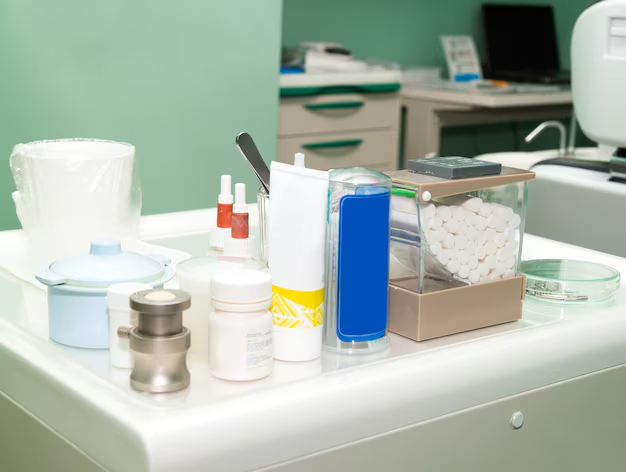**This article was generated with the assistance of AI. While efforts are made to provide accurate and helpful information, occasional errors or omissions may occur.
Safeguarding Your Health: Essential Tips for Keeping Medications Safe at Home
In today’s fast-paced world, managing medications can feel overwhelming. Yet, it’s crucial to ensure they remain safe, both from accidental misuse and environmental damage. Whether you're caring for children or simply organizing your own pharmaceuticals, a well-implemented strategy for medication safety at home can significantly enhance your peace of mind. Let's delve into a comprehensive guide that will empower you to keep your medications safe and secure.
Understanding the Importance of Medication Safety
The essence of medication safety lies in preventing accidents, preserving drug efficacy, and ensuring that these life-enhancing substances continue to provide their intended benefits. Consider these key motives:
- Preventing Accidental Ingestion: Unsupervised meds can be a significant hazard, especially for curious children or confused elders.
- Maintaining Drug Potency: Many medicines degrade more rapidly when exposed to heat, light, or moisture.
- Avoiding Misuse and Abuse: Prescription medications can be a target for misuse; secure storage minimizes this risk.
- Optimizing Health Management: Proper organization and storage contribute to timely and accurate consumption.
Start with Smart Storage Solutions
Selecting the Right Storage Location
Where you choose to store your medications can have a big impact on their safety and efficacy. Here are some suggestions:
- Out of Reach and Sight: Always store medications in an inaccessible place for children and pets. Use a high cabinet with a safety latch if necessary.
- Avoid the Bathroom and Kitchen: These areas can be humid and hot, which may degrade the medication quality.
- Consider a Lockable Cabinet: For enhanced security—especially for controlled substances—a lockable medicine cabinet may be optimal.
Environmental Considerations
Beyond location, the environment plays a crucial role in maintaining drug safety. Here's what to keep in mind:
- Temperature Control: Store medications at room temperature, unless the packaging specifies refrigeration.
- Light and Moisture Sensitivity: Use opaque and airtight containers to shield certain medications from light and moisture.
- Label Awareness: Regularly check medication labels for storage instructions that may suggest specific environmental conditions.
Organizing Your Medication
Sorting and Categorizing
Efficient organization ensures you're not just preventing accidental ingestion but that you're also using medications safely and efficiently.
- Grouping by Type: Consider organizing by the type of medication—such as daily prescriptions, over-the-counter meds, and supplements.
- By Frequency: Separate medications taken daily from those used only when necessary.
- Color-Coding or Labels: Utilize colored baskets or label file folders for quick, visual identification.
Leveraging Technology for Medication Management
- Medication Apps: Utilize smartphone apps to track your medication schedule and receive reminders.
- Digital Lock Pill Cabinets: Advanced cabinets use app controls for added security and efficiency.
Education and Communication
Educate Family Members
The knowledge within your household can act as an additional barrier against medication misuse and accidents.
- Regular Discussions: Have open conversations about the importance of medication safety with all family members.
- Explain Dangers: For children, explain that medications are not candy and should only be handled by adults.
- Create Visual Guides: Use posters or charts that remind family members of do’s and don’ts about medication safety.
Coordinate with Healthcare Providers
- Pharmacist Consultations: Regular consultations can provide fresh insights into safe storage practices.
- Medical Reviews: Routine check-ins with doctors can mitigate risks related to outdated or unnecessary medications.
Safe Disposal Practices
Disposing of medications safely is as crucial as storing them correctly to prevent misuse and environmental harm.
Identify Obsolete or Expired Meds
- Routine Checks: Set a regular schedule, such as monthly or quarterly, to go through your medications and remove what is no longer needed or safe.
- Expiration Dates: Discard anything past the expiration date immediately.
Proper Disposal Techniques
- Drug Take-Back Programs: Participate in these community programs for safe disposal of unused meds.
- Household Disposal Steps: If take-back isn't available, mix medications with substances like dirt or used coffee grounds in a sealed plastic bag before discarding.
Proactive Steps to Enhance Medication Safety
Here are some practical tips and takeaways:
- 📍 Location Is Key: Store meds out of reach and away from heat and moisture.
- 🕵️♀️ Stay Organized: Use containers and labels meaningfully.
- 🚫 Immediately Remove Expired Meds: Prevent use of outdated prescriptions.
- 🔒 Secure High-Risk Substances: Lock away controlled medications.
- 🧑⚕️ Communicate Clearly: Regularly discuss safety with family and healthcare providers.
- 🌿 Avoid Cross-contamination: Separate foods, supplements, and pinpoint medications precisely.
Creating a Habit of Regular Review
Forming a routine to regularly check in on your medication storage practices is essential. Automate reminders where possible, and sync reviews with other routine activities, like renewing prescriptions. This methodical approach ensures that your medication safety process remains efficient and reassuring over time.
Bringing It All Together
Ultimately, the task of keeping medications safe at home blends thoughtful planning with proactive management. By following these guidelines, not only do you enhance the safety of your living environment, but you also contribute significantly to effective health management for you and your loved ones. Embrace these strategies today to ensure that your home remains a safe, healthy space for everyone involved.

Related Topics
- Best Home Security Systems For Seniors
- Best Locks And Security Devices For Seniors
- Best Medical Alert Devices
- Elder Financial Abuse Signs
- Emergency Preparedness For Seniors
- Fire Safety Tips For Seniors
- Home Safety Tips For Seniors
- How To Avoid Phone Scams Targeting Seniors
- How To Avoid Senior Scams
- How To Create a Safe Living Environment
- How To Protect Against Identity Theft
- How To Recognize Caregiver Abuse
- Neighborhood Watch Programs Explained
- Protecting Digital Accounts For Seniors
- Safe Driving Tips For Seniors
